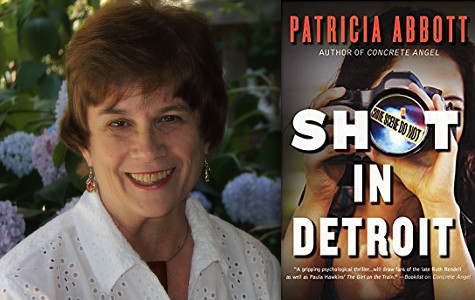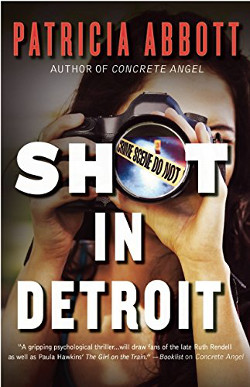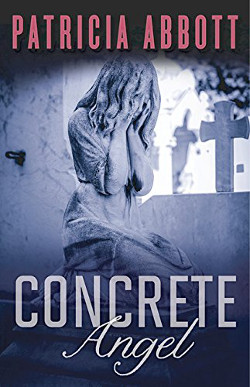
Patricia Abbott is the author of more than 150 short stories that have appeared in print and online publications. She won the Derringer Award in 2008 for her story “My Hero.” She is the co-editor of the e-anthology Discount Noir. Collections of her stories, Monkey Justice and Other Stories and Home Invasion, were published by Snubnose Press.
In 2015, Polis Books published the novel Concrete Angel. They are also the publisher of Shot in Detroit, which has been nominated for an Edgar Award for Best Paperback Original.
Ms. Abbott was generous enough to answer some questions about her latest novel, her Edgar nomination, and what’s next for her!
How did you find out about the Edgar nomination for Shot in Detroit? Is it an early morning phone call like the Oscar noms?
An email was sent to me at 9 o'clock on that morning, but we have this peculiar issue that if either of us opens our jointly shared iPad, it doesn't turn up on our computers, which is where I read my emails. So I missed it for a few hours. I only heard when Art Taylor, always the gentleman, congratulated me on Facebook.
In Shot in Detroit, the city is a character in itself. Are you a native? If not, how did you end up there?
I am a native of Philadelphia, where Concrete Angel was set. I came to Detroit in 1970, when I was 22 and my husband was hired as an assistant professor at Wayne State University. There is much of Detroit I missed, like the glory days of the ‘40s and ‘50s, the 1967 riot.
Read Katherine Tomlinson's review of Shot in Detroit!
You wrote a lot of short stories before writing your first novel, Concrete Angel. Was it tough to switch gears?
It was incredibly tough. The hardest thing was how to populate a novel. All of the elements I had been taught in writing workshops to cut, I now had to add. I think my two novels are still sparsely populated. I haven't quite mastered how to give my protagonists girlfriends, for instance. And I still feel vaguely guilty if I describe anything beyond a few words. Do you really want to know what she looks like, what kind of day it is, or the car she drives?
Do you have a schedule for writing? A particular time you write every day? A particular number of words you want to write each day?
If things are going well, which they aren't right now, I write off and on until about 3. From 9–3 on a good day, with breaks to clean toilets and make lunch. For years I had a job, however, and then I wrote on my lunch hour and on weekends. I was always too tired at the end of the day coming to it as late as I did. I was in my mid-40s when I started writing.

In Shot in Detroit, your protagonist is a photographer. Did you have to research that?
I read several books, such as Susan Sontag's On Photography, and articles online. I also had a friend who was a photographer for the Detroit Institute of Arts take a look at the sections that were technical, and he corrected a few mistakes. I also had a Detroit police detective look at what I said about the Detroit Police. He corrected my notions about how detective work in Detroit is done and how it works on Belle Isle especially. But on the whole, I kept it as non-specific as possible.
Who reads your work first?
My husband. And, until recently, my writing group. My husband gives me confidence, and the group takes it away. Only kidding. But my writing group(s) caught stuff I missed. In particular, Anca Vlasopolos and Dorene O'Brien help shape the books.
Do you read your reviews?
No. Well, that's not completely true. If a friend reviews it on their blog, I feel I owe it to them to read it. But if the review is good, I don't trust it, and if it's bad I believe every word. I don't look at Amazon at all. Or Goodreads. Megan [ed. note: novelist Megan Abbott is Patricia Abbott’s daughter] warned me about doing this before I began, and I trust her judgment.
How long did it take you to write that first novel? Was it easier the second time around?
I wrote Shot in Detroit first. It took several years of writing and lots of trying to get an agent, and I got nowhere with it. People who read it hated Violet or thought it fell between a literary novel and a genre novel—which it does. I sent it to Hard Case Crime, who said it simply didn't have enough bodies for them. So when I wrote Concrete Angel (which went much faster), I put a murder on the first page—although it's the only murder. But that was the one that got me a publisher.

Your publisher is Polis Books. Did you send your first book to them over the transom, or did you have an agent shop it around? (In other words, how did you pick them?)
I had a contract with Angry Robot first. Bryon Quertermous was a new acquisitions editor for them, and he was familiar with my work and agreed to read it and then acquire it. But almost immediately, Angry Robot was sold, and the new owner did not want a crime line. So, Bryon suggested Polis Books, which was publishing his first novel. Jason Pinter from Polis read my book very quickly and offered me a two-book deal when I told him I had another novel. Jason did a great job of getting the book some first-class blurbs, getting a nice cover, and getting it out pretty quickly. He also got it reviewed in the industry review journals. I was amazed at how well Polis did all of this as a newbie in the field. And, I was amazed that an agentless writer was treated so well.
How long did the publishing process take?
It did not take very long. I had a pretty tidy draft, which they immediately began work on. So I am thinking about a year. The two tend to run together for me now, but I think about a year.
Have you done much marketing for the book? Readings? Appearances? Do you enjoy that aspect of being a writer?
Most of my marketing has been through online blogs and sites. I set up a blog tour and asked a lot of people to interview me or feature the book. Because I had an extensive network of online friends due to my blog and my many years of being active online, I was able to take advantage of this. I have done a few readings/talks with both books. I dread them, but then end up enjoying it, which really surprised me. What success I have had (and it's a small amount) is almost totally due to people who reached out to me and my local libraries and bookstores. Or people who gave me a voice on their blog. There are too many to name here, but you can see a list on my blog pattinase.
You went to Bouchercon 2016 in New Orleans. Was that your first “con?” Did you enjoy it? Will you be going to Bouchercon 2017?
I have been to many Bouchercons. I think about six. The first was in Chicago. Since I was a short story writer, I have been on a few panels over the years on related topics. I did not get to New Orleans, in fact, but hope to be at Toronto. I do not really enjoy conferences because I am very shy in person. It is nearly impossible for me to walk up to anyone and introduce myself. I am even reluctant to approach my daughter at one of these events. Everyone seems too important to bother.
Your blog (Pattinase) is a tremendous resource for anyone interested in crime fiction. I particularly like the Friday’s Forgotten Book feature. Have you always been a mystery fan?

I have always been a mystery fan. And so was my mother. I do read other fiction too, but more crime than not. I like straightforward stories, and crime fiction does this best. I have a friend who reads a mystery every day. I would never limit myself that much, but I admire her depth of knowledge of the genre.
What was the first piece of crime fiction you wrote? Who published your first story?
Sarah Weinman published a story of mine called “Catnap” in a journal called Shots, and Bryon Quertermous took one called “The Squatter” for Demolition. Both were published in April 2006. I had many stories published in literary journals before that, but those were the first crime stories. Although, if I review my earlier stories, almost all of them were dark. Clearly, I was working my way to crime.
What was the first mystery you remember reading?
As a kid, I read all of Nancy Drew. But as an adult, it would have been The Murder of Roger Ackroyd, which I had no idea was a rule-breaker. I found a box of Christies minus the covers on the boardwalk in Ocean City, NJ, and bought one after the other during a summer vacation. My husband did too, and we put our lounge chairs in the ocean and read all day.
What are you reading now?
I am reading Tana French's The Trespasser, John O'Hara stories, and a novel about Cuba called Distant Marvels for my book group. I just ordered two Joan Didion books of essays because I hadn't read them in 30 years and wanted to revisit.
Who are some of your favorite writers?
Tana French, Laura Lippman, Sandra Scoppettone, Patricia Highsmith, Margaret Millar, Richard Yates, Ross Macdonald, Stewart O'Nan, Alice Munro, Bill Crider, Joe Lansdale, Naomi Hirahara, Sara Gran, Ann Patchett, Alison Gaylin, Lou Berney, Sjowall and Wahloo, Nicholas Freeling, Ruth Rendell, Adrian McKinty, Ken Bruen, Henning Mankell, Megan Abbott.
You’re on Facebook where you often ask thoughtful questions and solicit opinions on a wide range of topics. What do you find engages your friends and readers the most?
I think what I share with most of my Facebook friends (not so much my real life ones) is a love of story. Be it a book, a short story, a TV show, a movie, the news—we all seek out stories that will elevate us, take us away from the mundane, and entertain. Reading has been such a big part of my life; I can't understand those who don't read. And read novels, I mean. Reading non-fiction is something else entirely for me.
Are you on other social media platforms? Do you tweet? Instagram?
I only tweet in the rare instance I think of something pithy to say or want to retweet what someone else has said. Instagram is mostly for my family.
You’re open about your political views on Facebook. Have you had any backlash from readers who don’t share your views?
Oh, yes. I have had to pull down at least a dozen posts where the comments got too heated. Or where I felt I had been too angry. I know some people would like Facebook to only be about pleasant things, and I might have shared their view in the past. But we are fighting a war for the survival of our democracy now, and as much as I try to restrain myself, it comes out. If I were 30 and had a long career in front of me, I might be more careful. But at my age…
There have been a lot of complaints that women writers are somewhat marginalized in the crime writing community. Do you agree that’s true?
It drives me crazy when men post their favorite books of the year and all of them are by male writers. This happens all the time. And yet, I have never seen such a list compiled by a woman. And, if truth be told, at this time many of the best books are being written by women in my opinion. They are able to write crime books that also examine society.
What’s next?
Good question. I am having a lot of trouble deciding where to go right now. I will let you know when I figure it out!
To learn more or order a copy of Shot in Detroit, visit:
opens in a new window![]() opens in a new window
opens in a new window![]()
Patricia Abbott is the author of more than 100 stories in print, online, and in various anthologies, including Needle Mag, The Thrilling Detective, Plots With Guns, Spinetingler, and ThugLit. In 2009 she won a Derringer Award for her story My Hero. She is the author of two ebooks of stories: Monkey Justice and Home Invasion (through Snubnose Press). Her debut novel, Concrete Angel, was released by Polis Books in summer 2015. She is the coeditor of Discount Noir (Unteed Reads). She makes her home in Detroit. Follow her on Twitter at @pattinaseabbott.
Katherine Tomlinson is a former reporter who prefers making things up. She was editor of Astonishing Adventures Magazine and the publisher of Dark Valentine Magazine. She edited the charity anthology Nightfalls. Her dark fiction has appeared in Shotgun Honey, A Twist of Noir, Luna Station Quarterly, and Eaten Alive, as well as anthologies, including Weird Noir, Pulp Ink 2, Alt-Dead, Alt-Zombie, and the upcoming Grimm Futures, which she also edited. Her most recent collection of short stories is Suicide Blonde. She sees way too many movies.

Excellent interview on both parties’ behalf. Interesting that it was people’s girlfriends that are a question…not so much the boyfriends…but, then, the protags so far are more likely to have boyfriends…
Terrific interview and much congratulations to Patti on her Edgar nomination. Hugs, T